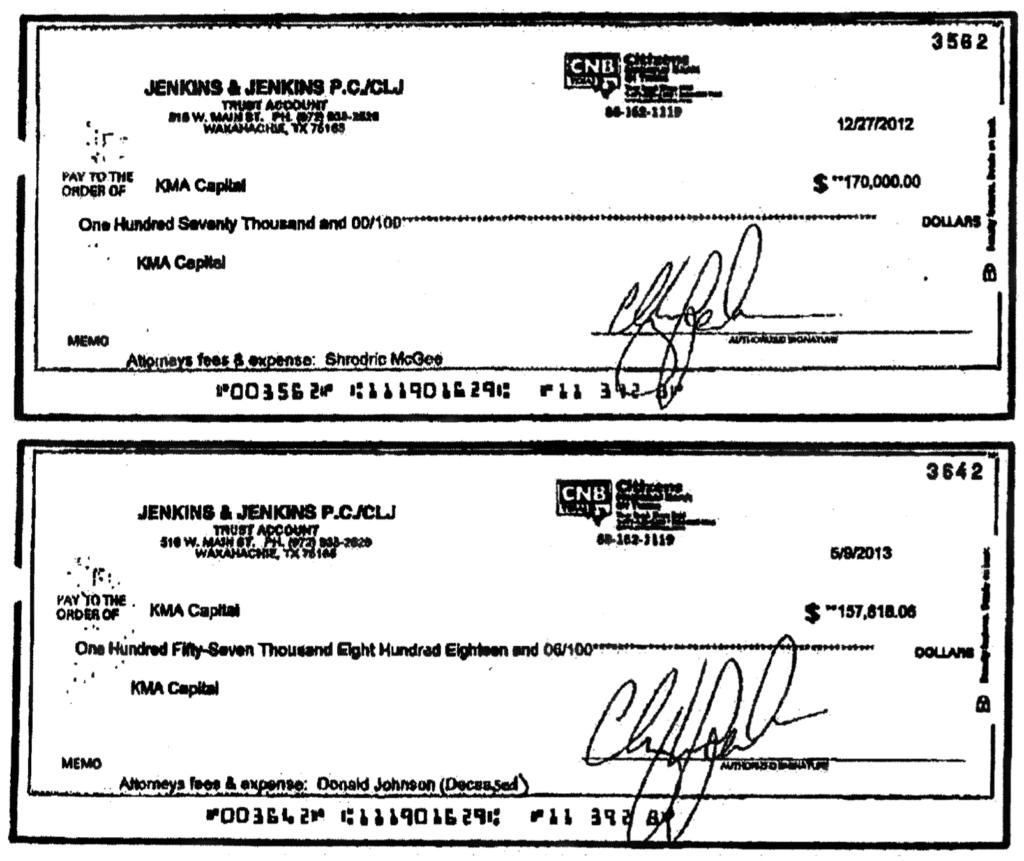Dallas County Judge Clay Jenkins sent over $450,000 in signed checks to a now-defunct shell company, potentially breaking Texas law and providing grounds for disbarment.
Ongoing lawsuits related to the estate of deceased celebrity lawyer Brian “Strong Arm” Loncar have revealed that Jenkins, an associate of Loncar’s, sent hundreds of thousands of dollars in attorney referral fees to a shell company allegedly used to hide money from Loncar’s wife.
Data retrieved from Open Corporates shows that KMA Capital was founded in 2009 and involuntarily dissolved in 2014. A man named Michael Press was listed as its director.
Beyond this scant information, very little is publicly available concerning KMA, what it did, or its relation to Brian Loncar prior to his death in 2016.
After his passing, however, Brian’s wife, Sue Loncar, sued KMA’s director, Michael Press, for money she believed was due to her per a financial partition agreement she had with her husband.
A forensic analysis of Brian Loncar’s finances, reviewed by The Dallas Express, stated that several people “acknowledged Brian told them he sent money to KMA because he would need money after his divorce.”
The report documented that a “total of $901,302 was diverted to KMA during the years 2012 through 2014. This amount was supported by checks sent by three law firms directly to KMA.”
The forensic investigation also revealed that out of all the firms to which Loncar referred cases, only the firms of Richard Laminack, Clay Jenkins, and W. Mark Lanier sent the checks to KMA instead of directly back to the Loncar firm, as would be expected.
Out of the three firms, Jenkins sent the most money to KMA by far, totaling over $450,000 in the span of three years.

Checks signed by Jenkins, one for $170,000, the other for $157,818.
Correspondence from Brian Loncar to the participating firms makes it clear that a large portion of the money being sent to KMA comprised the payment of referral fees that would typically be sent back to Loncar directly. Indeed, such payments could have violated Texas regulations.
Furthermore, Sue Loncar’s suit summarized the allegations, suggesting that “Brian Loncar instructed attorneys from other law firms to pay referral fees from certain cases to KMA Capital, Inc. instead of his own law firm’s accounts.”
Such activity has the potential to be unlawful as the state of Texas has specific rules for how referral fees may be handled.
According to Rule 7.03(e) of the Texas Disciplinary Rules of Professional Conduct, “A lawyer shall not pay, give, or offer to pay or give anything of value to a person not licensed to practice law for soliciting or referring prospective clients for professional employment.”
Sue Loncar requested that Michael Press produce all documents and correspondence regarding her husband’s involvement with KMA, including all “attorney referral checks being deposited in KMA Capital’s bank account.”
However, Press denied having anything “responsive to this request.”
In a separate lawsuit, Brian’s father, Phil Loncar, similarly alleged, “Clay Jenkins and his law firm has paid referral fees to non-lawyers and are personally involved in the KMA Capital issues. Jenkins has alleged that monies owed to the Loncar law firm were unlawfully diverted to KMA, yet Jenkins and his law firm paid ‘referral fees’ to KMA (non-lawyers).”
Furthermore, Phil Loncar suggested that Jenkins purchased the Loncar Law Firm in order to hide the transfer of funds to KMA.
“The disclosure of these unlawful payments could, therefore, have potentially catastrophic consequences for Jenkins, both as a licensed attorney and as the Dallas County Judge,” according to court filings.
The Dallas Express reached out to Jenkins for comment regarding the ongoing litigation pertaining to the Loncar estate and the checks he signed and sent to KMA Capital. As of the publication of this article, Jenkins had failed to respond.
Allegations against Jenkins continue to unfold and The Dallas Express will continue to report on them as further information becomes available. Updated coverage will be added below.
November 1: Jenkins allegedly sold himself a dead man’s law firm.
November 3: Jenkins allegedly abused his office to alter police reports and testimony.


